Serving 1,723 students in grades 9-12, Junction City Sr High School ranks in the bottom 50% of all schools in Kansas for overall test scores (math proficiency is bottom 50%, and reading proficiency is bottom 50%).
The percentage of students achieving proficiency in math is 18% (which is lower than the Kansas state average of 29%). The percentage of students achieving proficiency in reading/language arts is 23% (which is lower than the Kansas state average of 32%).
The student:teacher ratio of 13:1 is equal to the Kansas state level of 13:1.
Minority enrollment is 54% of the student body (majority Hispanic and Black), which is higher than the Kansas state average of 39% (majority Hispanic and Black).
Quick Stats (2025)
- Grades: 9-12
- Enrollment: 1,723 students
- Student:Teacher Ratio: 13:1
- Minority Enrollment: 54%
- Graduation Rate: 82% (Btm 50% in KS)
- Overall Testing Rank: Bottom 50%
- Math Proficiency: 18% (Btm 50%)
- Reading Proficiency: 23% (Btm 50%)
- Science Proficiency: 29% (Btm 50%)
- Source: National Center for Education Statistics (NCES), KS Dept. of Education
Top Rankings
Junction City Sr High School ranks among the top 20% of public schools in Kansas for:
Category
Attribute
Diversity
School Overview
Junction City Sr High School's student population of 1,723 students has grown by 20% over five school years.
The teacher population of 133 teachers has grown by 11% over five school years.
Grades Offered
Grades 9-12
Total Students
1,723 students
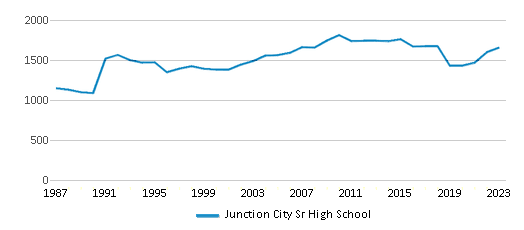
Gender %
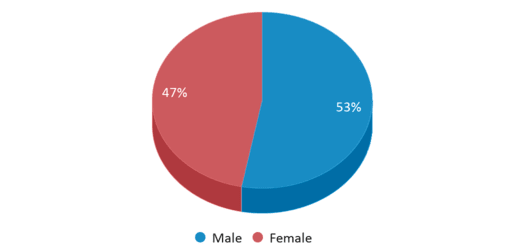
Total Classroom Teachers
133 teachers
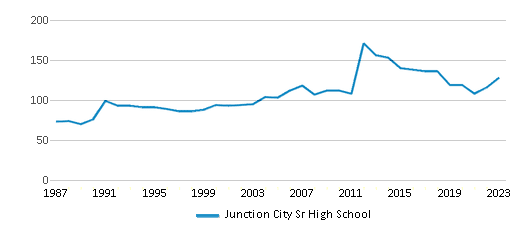
Students by Grade
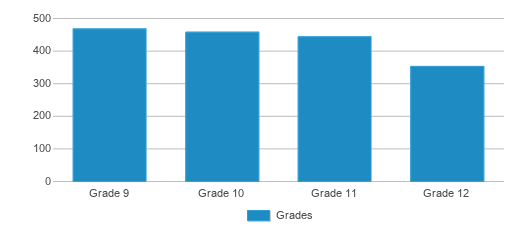
School Rankings
Junction City Sr High School ranks within the bottom 50% of all 1,280 schools in Kansas (based off of combined math and reading proficiency testing data).
The diversity score of Junction City Sr High School is 0.71, which is more than the diversity score at state average of 0.57. The school's diversity has stayed relatively flat over five school years.
Overall Testing Rank
#940 out of 1280 schools
(Bottom 50%)
(Bottom 50%)
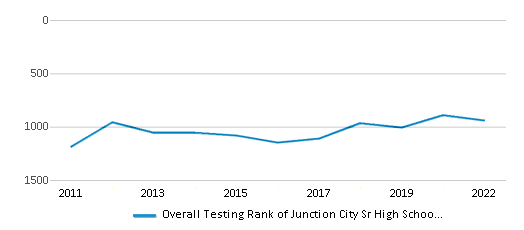
Math Test Scores (% Proficient)
18%
29%
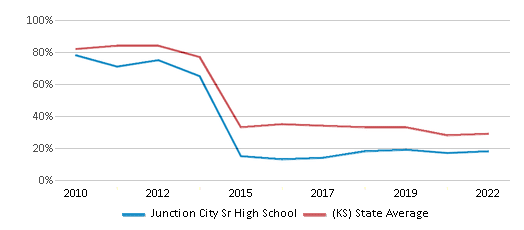
Reading/Language Arts Test Scores (% Proficient)
23%
32%
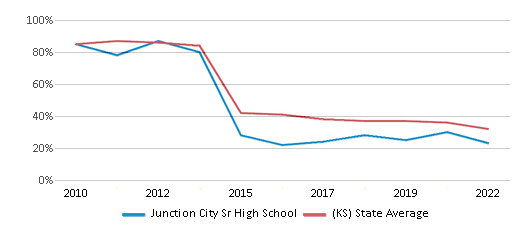
Science Test Scores (% Proficient)
29%
31%
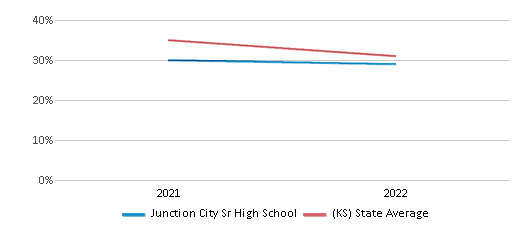
Student : Teacher Ratio
13:1
13:1
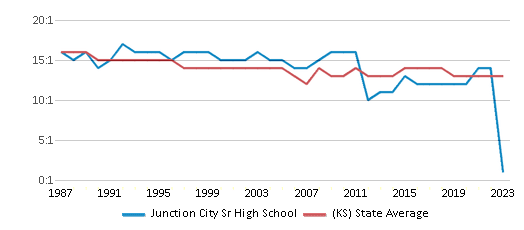
American Indian
n/a
1%
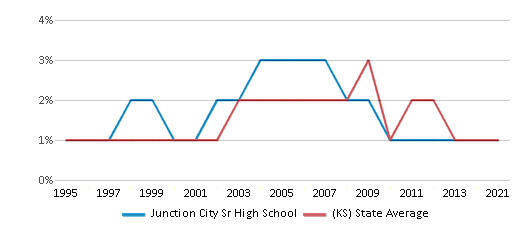
Asian
3%
3%
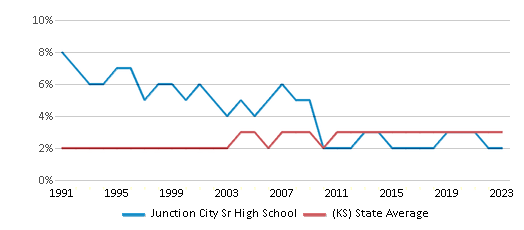
Hispanic
20%
22%
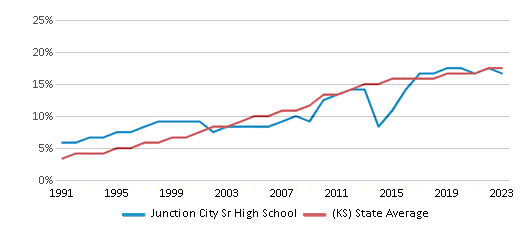
Black
18%
7%
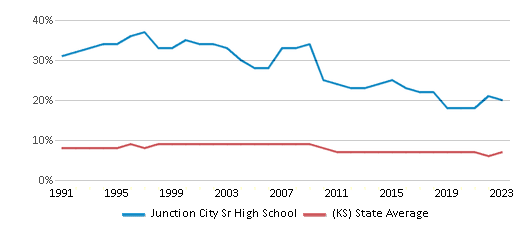
White
46%
61%
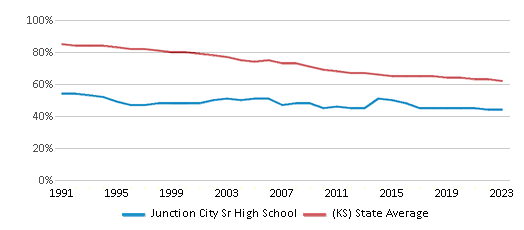
Hawaiian
3%
n/a
Two or more races
10%
6%
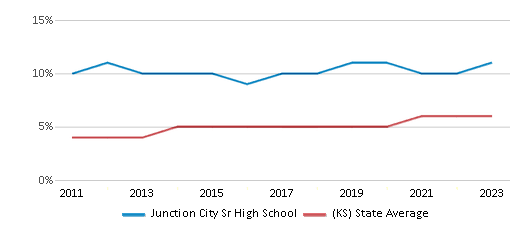
All Ethnic Groups
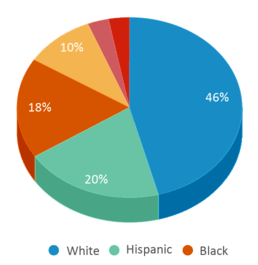
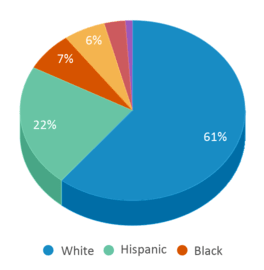
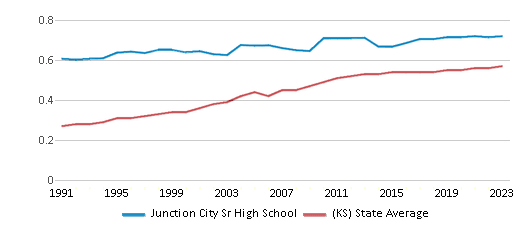
Graduation Rate
82%
89%
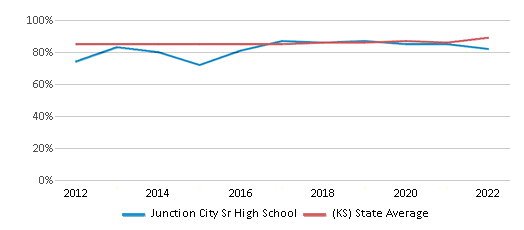
Participates in the National School Lunch Program (NSLP)
Yes
Eligible for Free Lunch
40%
42%
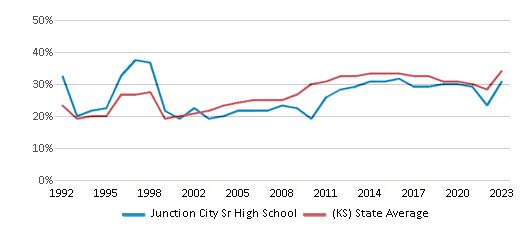
Eligible for Reduced Lunch
13%
7%
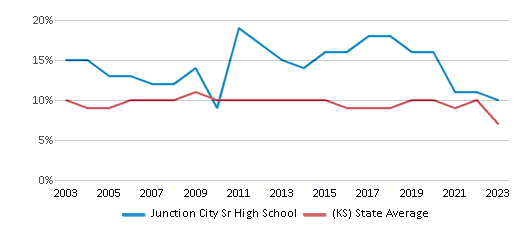
School Statewide Testing
School District Name
Source: National Center for Education Statistics (NCES), KS Dept. of Education
Profile last updated: 02/09/2025
Frequently Asked Questions
What is Junction City Sr High School's ranking?
Junction City Sr High School is ranked #940 out of 1,280 schools, which ranks it among the bottom 50% of public schools in Kansas.
What percent of students have achieved state testing proficiency in math and reading?
18% of students have achieved math proficiency (compared to the 29% KS state average), while 23% of students have achieved reading proficiency (compared to the 32% KS state average).
What is the graduation rate of Junction City Sr High School?
The graduation rate of Junction City Sr High School is 82%, which is lower than the Kansas state average of 89%.
How many students attend Junction City Sr High School?
1,723 students attend Junction City Sr High School.
What is the racial composition of the student body?
46% of Junction City Sr High School students are White, 20% of students are Hispanic, 18% of students are Black, 10% of students are Two or more races, 3% of students are Asian, and 3% of students are Hawaiian.
What is the student:teacher ratio of Junction City Sr High School?
Junction City Sr High School has a student ration of 13:1, which is equal to the Kansas state average of 13:1.
What grades does Junction City Sr High School offer ?
Junction City Sr High School offers enrollment in grades 9-12
What school district is Junction City Sr High School part of?
Junction City Sr High School is part of Geary County Schools School District.
School Reviews
2 1/29/2015
School needs an enema! With a high profile military base and jc being a "military town" you would think the school would have a higher rating than a 3; USD 475 even gets federal money from the federal government to run this school district! From students at the freshman success academy hiding marijuana in the neighborhood around the FSA during their morning walk to school, to the faculty members at the high school that try and be "friends" with their students instead of being an authority figure and being a teacher/instructor!! Yeah, you read it correctly, these 9th graders are hiding marijuana in neighborhood sheds in order to go (after meeting up with their school friends at school in the mornings, they then leave school grounds) and go smoke marijuana together!! I know this to be 100% fully true. This kind of behavior seems to be perpetrated by a certain group of individuals who seem to prey on the weaker students and influence them with unreasonable amounts of peer pressure! Better watch and keep tabs on your children! But, the students definitely reflect their parents that live in the community hood of JC.
Review Junction City Sr High School. Reviews should be a few sentences in length. Please include any comments on:
- Quality of academic programs, teachers, and facilities
- Availability of music, art, sports and other extracurricular activities
Recent Articles

What Is A Charter School?
Explore the world of charter schools in this comprehensive guide. Learn about their history, how they operate, and the pros and cons of this educational innovation. Discover key facts about charter schools, including admission policies, demographics, and funding, as well as what to look for when considering a charter school for your child.

10 Reasons Why High School Sports Benefit Students
Discover the 10 compelling reasons why high school sports are beneficial for students. This comprehensive article explores how athletics enhance academic performance, foster personal growth, and develop crucial life skills. From improved fitness and time management to leadership development and community representation, learn why participating in high school sports can be a game-changer for students' overall success and well-being.

February 05, 2025
Understanding the U.S. Department of Education: Structure, Impact, and EvolutionWe explore how the Department of Education shapes American education, from its cabinet-level leadership to its impact on millions of students, written for general audiences seeking clarity on this vital institution.





